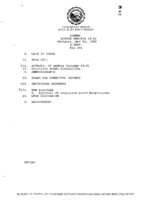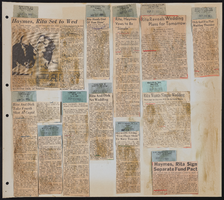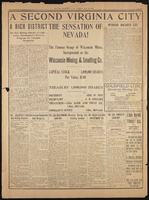Search the Special Collections and Archives Portal
Search Results

Transcript of interview with Jane Greenspun Gale by Barbara Tabach January 31 and February 9, 2018
Date
Archival Collection
Description
Jane Greenspun Gale-actor, activist, writer, magazine publisher, philanthropist, and farmer- has filled her life with accomplishments such as the Animal Foundation and Springs Preserve. It has also been a life filled with adventure - from “looking for John Lennon” during her time living and studying acting in London to learning to raise chickens on the acres of the Gilcrease Farm she owns with husband and photographer Jeff Gale. Everyone calls her Janie. Born Jane in 1949, she is the third of four children born to community leaders Barbara and Hank Greenspun. In this oral history, Janie captures the fun of growing up in Las Vegas under the watching eye of Hank. As a teen she and her friends cruised Fremont Street. Several years later she wanted to be arrested protesting the Atomic Test Site, when Hank diverted her into reporting about the event instead. Her Jewish foundation was at Temple Beth Sholom, where her parents were among the founding members. As the Jewish population grew, the tastes in synagogues grew to reflect the change. When Janie’s children preferred the Reform approach at Congregation Ner Tamid, a new family tradition began. She is proud of her background and shares loving stories of time spent with her grandparents as a child and pride in the heroic and dramatic story behind the naming of Hank Greenspun Plaza in Israel. Even her love story with Jeff is a tale made for movies. It unfolds in this engaging oral history interview along with anecdotes that are plucked from her personal history and preserve a reflection of growing up in Las Vegas, one of the Greenspun family of local fame.
Text

Transcipt of interview with John M. Beville by George Braver, March 11, 1981
Date
Archival Collection
Description
Text

Meeting minutes for Consolidated Student Senate University of Nevada, Las Vegas, May 11, 1989
Date
Archival Collection
Description
Text

Meeting minutes for Consolidated Student Senate, University of Nevada, Las Vegas, December 6, 1983
Date
Archival Collection
Description
Text

Transcript of interview with Ron Lawrence by Dennis McBride, June, July and August 1997
Date
Archival Collection
Description
Ron Lawrence is one of the busiest people in the gay community, so I want him to know how much I appreciate his reserving time for me so that I could complete this oral history interview. The importance of his work toward the well-being of the gay community in Las Vegas cannot be measured, and much of what he's accomplished and otherwise made possible will live long after he leaves us. With Ron's consent to this interview, our knowledge of Nevada's gay history is greatly enriched and our record preserved.
Text

Transcript of interview with Gilbert D. Yarchever by Claytee White, 2006
Date
Archival Collection
Description
Gilbert Yarchever was one of nine siblings, born and bred in Pittsburgh, Pennsylvania. He describes the way his mother?s family was granted the last name of ?Kurfeersf" by Emperor Franz Joseph (of Austria-Hungary), explains the Seder (the Jewish observation of the exodus of Hebrews from Egypt), and tells what it was like to survive the Depression. Gilbert describes the jobs he held after high school and the government examination he took that led to his lifetime of adventure and travel. He moved to Washington, D.C., in 1940 and kept himself busy working for the government and taking classes at George Washington University, as well as working part time at Hecht Department Store and as a freelance court reporter. Following the attack on Pearl Harbor in 1941, Gilbert was sent to Africa on a merchant ship, helped smuggle Jewish survivors into Jerusalem, and was assigned the task of negotiating with Arab sheikhs for laborers to build a road. In the years after that, he worked in Europe, Panama, Alaska, Japan, and Hawaii and describes many of the jobs he was responsible for and many of the individuals he met. He also married and had children, kept up with university classes whenever he could, and collected art objects and paintings. Following his retirement in 1977, Gilbert and his family came to Las Vegas and bought a condo in Regency Towers. He did some consulting work for a couple of years, and then he and his wife began traveling around the states and going abroad. He was involved with UNLV?s EXCEL program, the music department, and the Las Vegas Art Museum. (He and his second wife Edythe presented the first major exhibition on Holocaust art at the museum.) These days Gilbert often donates pieces from his art collection to churches, synagogues, and charitable organizations.
Gilbert Yarchever was in the Navy during World War II, helped smuggle Jewish refugees into Jerusalem, worked as a civil servant in many countries, and moved to Las Vegas in 1977. He helped found the EXCEL program at University of Nevada, Las Vegas and was an art collector with his wife, Edythe Katz-Yarchever.
Text

Erica Mosca oral history interview: transcript
Date
Archival Collection
Description
Oral history interview with Erica Mosca conducted by Cecilia Winchell, Stefani Evans, and Jerwin Tiu on February 3, 2023 for the Reflections: the Las Vegas Asian American and Pacific Islander Oral History Project. In this interview, Mosca reflects on her life journey from a low-income Asian American to a current serving Nevada State Assemblywoman. She recalls that most of her childhood was in Palm Springs, California where she enjoyed a diverse community of students within her education system. It was not until she moved to Navato, California where she first experienced the economic and resource gap between economically diverse areas. Mosca went on to be involved in a college readiness program and received a scholarship to Boston University. After college, Mosca went on to work for Teach for America where she was stationed on the east side of Las Vegas at Goldfarb Elementary School where she grew a passion for leadership. She eventually returned to school and graduated from Harvard University, returning to Las Vegas to start her nonprofit "Leaders in Training." Mosca hopes to inspire change in her communities by enacting legislation and initiatives targeted towards the communities she was and continutes to be a part of.
Text

Mariteresa Rivera-Rogers oral history interview: transcript
Date
Archival Collection
Description
Oral history interview with Mariteresa Rivera-Rogers conducted by Maribel Estrada Calderón on October 24, 2018 for the Latinx Voices of Southern Nevada Oral History Project. In this interview, Mariteresa discusses her early life in Concepción, Chile. She talks about her experience moving to Las Vegas, Nevada in 1965, the immigration process at the time, and becoming a Spanish language court interpreter. Rivera-Rogers recalls enrolling at the University of Nevada, Las Vegas' (UNLV) Sam Boyd School of Law, and her involvement with the Latino Bar Association. Lastly, Rivera-Rodgers discusses the challenges in translating Spanish language to English.
Text


